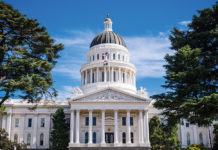Did you know that less than one percent of the earth’s water is available for human consumption? As California’s population continues to increase, climate change and periodic drought affect the amount of water supply available, and the demand for water to meet the needs of aquatic life and our environment continues to grow. Having enough water supply to balance all of the needs is becoming increasingly complex. Many communities throughout California are faced with the challenge of coming up with new and innovative ways to maximize the supply of drinking water, also called potable water. Recycled water can play a key role in responding to this complex issue and helping provide local, reliable water supplies to meet California’s water needs.
Recycled water is a valuable resource that more and more communities are incorporating into their water supply portfolios to help meet their current and future needs for water. Recycled water is produced at wastewater treatment facilities where sewage goes through a very stringent treatment process to produce tertiary treated recycled water. This high quality resource is safe to use for irrigation of landscapes, agricultural crops, and vegetable crops that are eaten raw, industrial processes, and many more non-drinking purposes. Recycled water is one of the most highly regulated water sources in the nation and must meet strict standards for health and safety as set by the California Department of Public Health; and for environmental quality as set by the Regional Water Quality Control Board. To ensure the safety of this water supply, recycled water is continuously tested and strictly regulated and monitored by regulatory agencies to ensure the water quality far exceeds its intended use.
To help stretch California’s limited water supply, the State Water Resources Control Board (State Water Board) adopted a Recycled Water Policy in 2009. The purpose of this policy is to safely increase the use of recycled water throughout California. California has set a goal of increasing the amount of recycled water used in California by one million acre-feet per year in 2020 and by at least two million acre-feet per year by 2030 when compared to 2002 levels. An acre-foot is the amount of water needed to cover one acre of land with a foot of water or approximately 326,000 gallons, and can provide for the water needs of approximately three households for one year. The State Water Board and the Department of Public Health share the view that recycled water is safe for approved uses.
Throughout the World, Nation and State, recycled water is used in thousands of locations with no documented cases of illness from its use. In the Russian River watershed several communities including Rohnert Park, Santa Rosa and Windsor are utilizing recycled water for landscape irrigation, agricultural irrigation and other approved uses. By using recycled water for irrigation, these communities are able to preserve precious potable supply to meet the drinking water needs of the current and future population. Recycled water systems increase sustainability and enhance the environment by keeping this resource local, reusing it, and offsetting the need to develop new fresh water sources. Recycled water also provides a reliable water supply that is highly valuable during periods of drought. This reliability benefits both the environment and the economy by preserving limited freshwater supplies during shortages and maintaining a consistent supply at a predictable cost.
Recycled water is a local, reliable and safe water supply that reduces the need to develop new fresh water supply sources and preserves our limited potable supply for humans and the environment. Nature has recycled our planet’s finite water supply for billions of years. By duplicating much of nature’s process, we produce a water that can be used for many beneficial, non-potable purposes. As water becomes more and more scarce, it is our responsibility to take advantage of the many uses of recycled water to ensure a sustainable future for the generations to come.
This article was authored by Teresa Gudino on behalf of Russian River Watershed Association (RRWA). RRWA (www.rrwatershed.org) is an association of local public agencies in the Russian River Watershed that have come together to coordinate regional programs for clean water, fisheries restoration, and watershed enhancement.
48.6
F
Healdsburg
April 21, 2025







